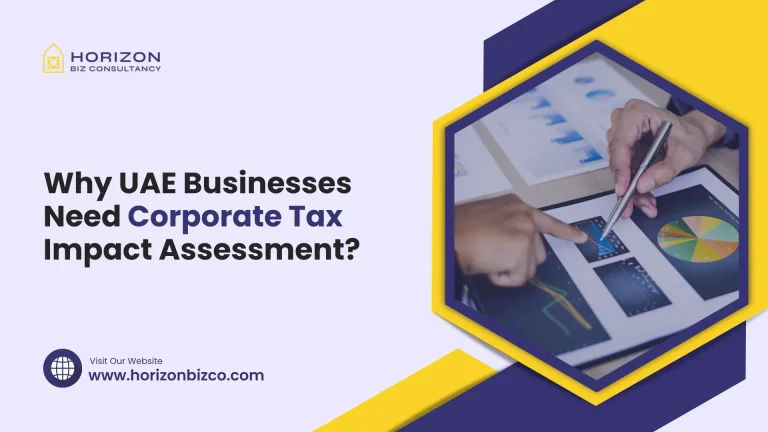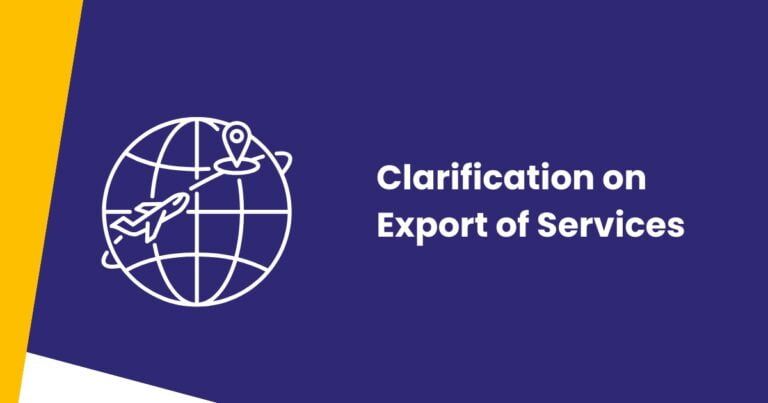The UAE government has announced that starting January 2023, most UAE businesses will need to pay a 9% corporate tax on profits over Dh375,000. This new tax rule can deeply impact your company’s finances and operations. So it is vital to do a proper impact assessment to understand how to adapt.
What is a Corporate Tax Impact Assessment?
A corporate tax impact assessment examines how the new tax will affect your business. It studies all areas – from profits to staff costs, investments to contracts. The goal is to forecast how much tax you may owe. And find ways to legally minimize the tax impact.
This assessment helps answer key questions like:
- How much extra tax will I need to pay yearly?
- What impact will tax have on my pricing and profits?
- Should I shift some operations to free zones with lower taxes?
Careful advance planning is the best way to prepare for this new financial obligation. Preparation is the key to seamlessly adapting when corporate tax implementation kicks off in 2023.
Why Should Businesses Assess The Tax Impact?
Here are five key reasons every UAE business must conduct a tax impact assessment:
Project Your Future Tax Obligations
You need to forecast how the 9% tax may impact your financial statements and shareholder agreements. Detailed projections will help estimate your tax liabilities and model best and worst case scenarios.
- Advance insight allows you to set aside provisions for tax payments.
- And make timely system upgrades.
Identify Tax Planning Opportunities
A thorough study can reveal tax planning opportunities you may have missed.
For example:
- Shifting certain operations to free zones can lower your tax exposure.
- Optimizing your corporate structure with tax-efficient holding companies.
Assessing all such options will maximize future savings.
Update Budgets and Pricing
The 9% corporate tax will directly hit your bottom line. How will you protect margins?
An impact analysis lets you:
- Evaluate pricing strategies.
- And factor accurate tax costs into budgets, quotations and shareholder returns.
Assess New Investments
All future investments will need a tax obligations review. Whether it is:
- New machinery
- A production facility
- Acquiring a company
Carefully assessing tax impacts will optimize investment return potential.
Retain Talent
Higher tax costs may force businesses to limit staff bonuses and salary hikes. An early study can help create staff retention plans.
For instance, you can:
- Set up tax-free staff insurance schemes
- Retirement plans
- Offer flexible work options
How Detailed Should The Assessment Be?
To fully understand the corporate tax impact, assess all direct and indirect effects across business functions.
Cover at least these six key areas:
Five-year Financial Projections
- Integrate the 9% tax rate into your future financial statements
- Perform sensitivity analysis by modeling 5-10% revenue fluctuations
Pricing Strategies and Margins
- Gauge how increasing prices can offset tax costs.
- Evaluate approaches to retain customers while protecting margins.
Staff and Shareholder Agreements
- Examine how contracts and staffing may need to change.
- Identify steps to motivate talent with non-financial rewards.
Accounting and Reporting Processes
- Identify new software, documentation needs and staff training for tax compliance.
Expansion Plans and New Investments
- Review upcoming growth plans and proposed capital investments for likely tax obligations.
Free Zone Migration Options
- Research if shifting some business operations to lower-tax zones can optimize costs.
Start Your Tax Planning Now
In summary, the 9% UAE corporate tax will significantly impact revenues and operations. A detailed impact assessment by a tax specialist can help forecast likely costs. And reveal planning opportunities to legally minimize tax exposure.
The time to start planning is now. Reach out to an experienced tax consultant to discuss how we can help your business prepare when corporate tax kicks in from 2023.
Conclusion:
The introduction of a 9% corporate tax on profits over AED 375,000 in the UAE is a significant development that businesses must prepare for diligently. This new tax regime will undoubtedly impact a company’s financial statements, operational strategies, and overall profitability. As such, conducting a comprehensive corporate tax impact assessment is an essential step in navigating this transition smoothly.
A well-executed impact assessment will not only help businesses forecast their potential tax liabilities but also identify opportunities for tax planning and optimization. By carefully evaluating factors such as pricing strategies, staff and shareholder agreements, accounting processes, expansion plans, and the feasibility of relocating operations to tax-efficient zones, companies can make informed decisions that protect their bottom line and ensure long-term sustainability.
FAQs
Ideally start 6-12 months before implementation i.e. latest by Q3 2022. The earlier you begin, the more tax planning options you can evaluate.
Some examples are shifting operations to tax-free zones, setting up tax-efficient holding company structures, optimizing corporate expenses and updating systems for tax accounting.
Yes, an expert consultant brings in-depth knowledge of the latest regulations. And can advise customized strategies aligned with your business needs.





